 Petzlover
Petzlover Formosan Mountain Dog is originated from Taiwan but Mioritic Sheepdog is originated from Romania. Formosan Mountain Dog may grow 23 cm / 9 inches shorter than Mioritic Sheepdog. Formosan Mountain Dog may weigh 42 kg / 92 pounds lesser than Mioritic Sheepdog. Both Formosan Mountain Dog and Mioritic Sheepdog has almost same life span. Formosan Mountain Dog may have more litter size than Mioritic Sheepdog. Formosan Mountain Dog requires Low Maintenance. But Mioritic Sheepdog requires Moderate Maintenance
Formosan Mountain Dog is originated from Taiwan but Mioritic Sheepdog is originated from Romania. Formosan Mountain Dog may grow 23 cm / 9 inches shorter than Mioritic Sheepdog. Formosan Mountain Dog may weigh 42 kg / 92 pounds lesser than Mioritic Sheepdog. Both Formosan Mountain Dog and Mioritic Sheepdog has almost same life span. Formosan Mountain Dog may have more litter size than Mioritic Sheepdog. Formosan Mountain Dog requires Low Maintenance. But Mioritic Sheepdog requires Moderate Maintenance
 The Formosan Mountain Dog is most often known as the Taiwan dog and it is a landrace indigenous to Taiwan. It is a small to medium breed of dog that was semi-wild at one time. The colonialization of Taiwan and other foreigners help to fully domesticate the Formosan Mountain Dog. They were found to be very trainable and uniquely suited for the terrain around Taiwan. The dogs were easy to train and now serve as hunting dogs, stunt dogs, guard dogs, rescue dogs, therapy dog and personal companions. There are three types of Formosans two smaller types and one medium. However, the original pure Formosan Mountain Dog is getting close to extinction again because the government and people have provided no protection or conservation efforts for them. These dogs have been living in Taiwan in the mountains and were called Formosan Mountain Dogs when Taiwan was known as Formosa. They come from a line of Southeast Asian hunting/gun dogs and they are considered ‘rare’ now.
The Formosan Mountain Dog is most often known as the Taiwan dog and it is a landrace indigenous to Taiwan. It is a small to medium breed of dog that was semi-wild at one time. The colonialization of Taiwan and other foreigners help to fully domesticate the Formosan Mountain Dog. They were found to be very trainable and uniquely suited for the terrain around Taiwan. The dogs were easy to train and now serve as hunting dogs, stunt dogs, guard dogs, rescue dogs, therapy dog and personal companions. There are three types of Formosans two smaller types and one medium. However, the original pure Formosan Mountain Dog is getting close to extinction again because the government and people have provided no protection or conservation efforts for them. These dogs have been living in Taiwan in the mountains and were called Formosan Mountain Dogs when Taiwan was known as Formosa. They come from a line of Southeast Asian hunting/gun dogs and they are considered ‘rare’ now.
According to historian Dr. Sung Yung-yi, the breed went through 4 major catastrophes that affected their development. The first of these was the Dutch Establishment in 1624. The Dutch colonized Taiwan and imported both people and dogs. The dog they brought in was called the Flying Dog and was either Greyhound or Pointer. Eventually, the Flying Dog bred with the Formosan Mountain Dog. This along with the slaughter of dogs belonging to the indigenous people by the government, starting the decline of the original Taiwan dog.
In 1895, it was the Japanese acquiring Taiwan following the First Sino-Japanese War. The Japanese bred the Formosan Mountain Dog extensively with the own Japanese dogs. This further diluted the line and authenticity of Taiwan dogs.
This was followed by World War II when German Shepherds traveled with the US Army and they cross-bred with the Formosan. This was the third major dilution of the Formosan Mountain dog line. At the same time, the Japanese government considered the Formosan Mountain Dog a sanitation threat and barbaric. They massacred them in large numbers in the name of sanitation.
The fourth and final dilution took place during the Kuomintang Era beginning in 1945 with the arrival of the Chinese Nationalist Party. They brought with them the culture of eating dogs. During this time the economy of Taiwan took off and business people began to import their own foreign dogs that were high priced purebreds. These dogs bred with the Formosan and other Formosans were just abandoned to die. The ranks of the breed became very thin indeed. Today’s pure Formosan is highly valuable and extremely rare. Because of all the crossbreeding over the centuries, today’s purebred Formosan Mountain Dog is very different from the Taiwan dog of old. Today’s Formosan is loved all over the island and is a companion and watchdog.
Today there is an effort by Taiwanese ecologists to put together a research project that would study and preserve the Formosan in its indigenous form. Dr. Yung-yi led this effort. He located only 46 dogs with a pure pedigree, 21 females and 25 males. They let the Food and Agricultural of the United Nations know and the dogs were labeled close to extinction. Reproducing from the indigenous dogs to purify and increase the breed was the goal. The government was not very supportive.
Today the Royal Air Force is looking at the Formosan Dog to use for military security. They are currently only using German Shepherds and needed another choice. It was decided that the Formosan Mountain Dog had a better sense of smell, dexterity, alertness, and hearing as well as better padding on their paws.
Through these efforts and those of foundation stock breeders and owners, the Formosan Mountain Dog in its indigenous form was brought back. Some call this dog a purebred Formosan while others consider it a new type. Standards were presented to the FCI for registrations as a purebred. This debate continues today
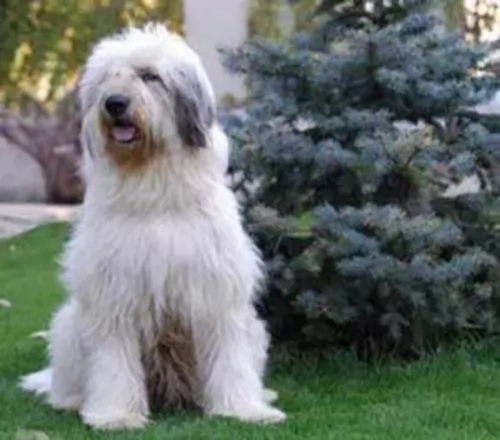 This is a large dog coming from the Carpathian mountain area of Romania.
This is a large dog coming from the Carpathian mountain area of Romania.
He has always been an excellent working dog, guarding and protecting sheep. Farmers always kept these dogs as working dogs, with no written records being kept about the development of the breed.
The breed is ancient, possibly dating back to ancient Roman times. It was in the 20th century that interest in the breed was ignited, and in 1981 the first official breed standard was recorded. The breed was also registered with the Federation Cynologique Internationale in 2005.
 The Formosan Mountain Dog that was seen during Dr. Sung Yung-yi’s research is a medium-sized dog, athletic and fit. It has a deep chest and a slim waist. The ears are half-covered, the nose is black and there is a coating of black on the tongue. This black tongue is the most distinguishing attribute of the Formosan Mountain Dog. The breed has a strong jaw, the skull that is just slightly longer than the muzzle, which is flat and tapered, triangle face and almond eyes. They have a thick coat and upright, curved tail.
The Formosan Mountain Dog that was seen during Dr. Sung Yung-yi’s research is a medium-sized dog, athletic and fit. It has a deep chest and a slim waist. The ears are half-covered, the nose is black and there is a coating of black on the tongue. This black tongue is the most distinguishing attribute of the Formosan Mountain Dog. The breed has a strong jaw, the skull that is just slightly longer than the muzzle, which is flat and tapered, triangle face and almond eyes. They have a thick coat and upright, curved tail.
The dogs are known to be extremely agile with an ability to hop that is rare in dogs but helps when hunting animals like rats. The Formosan Mountain Dogs hunted in packs with each dog attacking the prey with one bite until it was too exhausted to fight them off any longer.
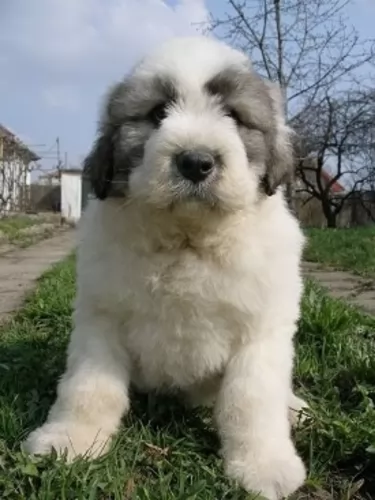 The Mioritic Sheepdog looks very much like the Old English Sheepdog with his huge body covered with long hair.
The Mioritic Sheepdog looks very much like the Old English Sheepdog with his huge body covered with long hair.
His head is also large with a black nose and smallish to medium length floppy ears. The color of the double coat is usually white, cream or pale gray, and sometimes you will find patches of these colors.
The tail has always been traditionally docked, otherwise the tail is left long with a slight curl at the end. The height of the dog is 65 to 75cm and he weighs roughly 50–60kg. Below the thick coat is a muscular dog with strong, straight legs which can help him become quite agile and speedy when needed. Allowed to breed, they can produce anything from 3 to 9 of the most adorable looking puppies.
The Mioritic Sheepdog is a balanced dog, loving to be with his owners but being wary of strangers. He is a brave dog, willing to guard his human family with his life.
He is also a strong-willed and dominant so it will be to his benefit to be trained and socialized so that he becomes obedient and easy to have around.Training won’t be difficult as he is an intelligent breed and already naturally obedient.
He is an energetic dog too so he will need to have regular exercise and games. He therefore gets on well with children in the home, loving to join in with all their games. He will need to be supervised around small children just because of his cumbersome, large size.
 The Formosan Mountain Dog is very child-friendly. He is affectionate and loyal to his family and protective of his children.
The Formosan Mountain Dog is very child-friendly. He is affectionate and loyal to his family and protective of his children.
He is intelligent and has exceptional hunting skills. He is a good guard dog due to his alertness, but they can be fear-aggressive.
He is very adaptable to living in any location as long as there is somewhere for him to get adequate exercise. He is friendly to people and animals.
He is intelligent and learns quickly.
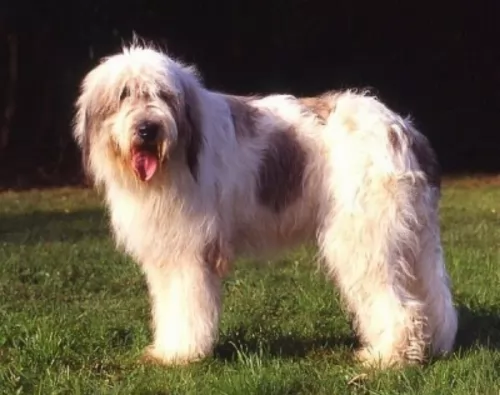 The Mioritic Shepherd has always been used to guard and protect livestock, but even though he has always taken this role seriously, he is calm and loving around his human family, making a splendid family pet.
The Mioritic Shepherd has always been used to guard and protect livestock, but even though he has always taken this role seriously, he is calm and loving around his human family, making a splendid family pet.
He also plays the role of guardian and protector of his human family seriously. He is a big strong dog and training and socialization will become necessary as he can become aggressive with certain people who he doesn’t trust.
Inviting one of these dogs into your home will ensure having a constant and loving companion at your side.
 Because there have not been any studies done on the health of the Formosan Mountain Dog, there is not a lot known about any inherent or genetic health issues. It would seem that some bloodlines are healthy, and others have some serious issues. Especially because there are no studies, it is important for breeders to test for eye issues and skeletal issues through the Orthopedic Foundation for Animals and the Canine Eye Registration Foundation.
Because there have not been any studies done on the health of the Formosan Mountain Dog, there is not a lot known about any inherent or genetic health issues. It would seem that some bloodlines are healthy, and others have some serious issues. Especially because there are no studies, it is important for breeders to test for eye issues and skeletal issues through the Orthopedic Foundation for Animals and the Canine Eye Registration Foundation.
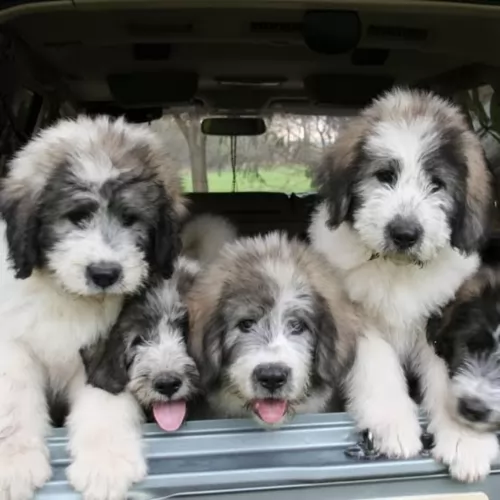 The Romanian Mioritic Shepherd Dog is a truly hardy dog breed and with good care such as good food and exercise can reach 14 years of age.
The Romanian Mioritic Shepherd Dog is a truly hardy dog breed and with good care such as good food and exercise can reach 14 years of age.
There are always some common dog illnesses to look out for and because he is a large dog, hip dysplasia can be a problem.
This is a disease where there is abnormal growth of the hip joints. Smooth movement of the joint is hindered and this leads to inflammation and pain.
At first you may find your dog limping and then you may find that after lying down, he battles to get up again. The joint becomes thickened with less mobility and the dog is reluctant to play like he used to. He will certainly need to get to the vet for treatments to make him more comfortable.
 Feed a high-quality puppy food for medium size dogs at the rate of a ¼ cup twice a day until 8 months then ½ to ¾ twice a day until 12-16 months.
Feed a high-quality puppy food for medium size dogs at the rate of a ¼ cup twice a day until 8 months then ½ to ¾ twice a day until 12-16 months.
1 to 2 cups of high-quality dry food split into 2 meals per day.
Generally healthy breed. Keep clean and watch for mites.
This is an energetic breed and he needs a lot of exercise. He must have at least an hour of exercise daily but the more, the better. He loves swimming and jogging with his people. He’s athletic, smart and agile. He does well with field trials, tracking, agility, and obedience.
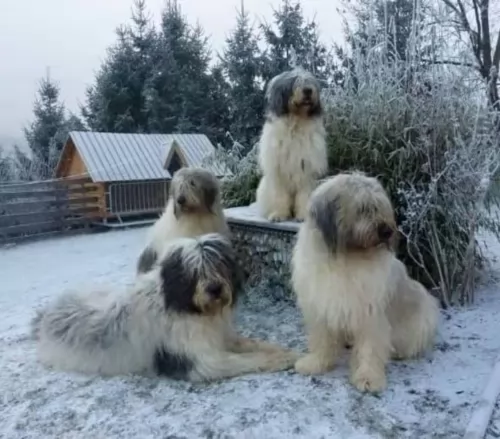 The Mioritic Sheepdog’s long hair is coarse and will need to be regularly brushed to keep it free of tangles. It will certainly need to be brushed 2 or 3 times a week, while some owners of this dog will prefer to have the coat professionally clipped. Because of the long hair, while brushing him it is an excellent time to check for ticks and fleas.
The Mioritic Sheepdog’s long hair is coarse and will need to be regularly brushed to keep it free of tangles. It will certainly need to be brushed 2 or 3 times a week, while some owners of this dog will prefer to have the coat professionally clipped. Because of the long hair, while brushing him it is an excellent time to check for ticks and fleas.
The food you give your pet plays such a critical role in his health and longevity. Always make sure that you’re giving your pet an uncomplicated diet to avoid stomach upsets.
Give him the best commercially manufactured kibble. To provide him with some variety, add in some boiled chicken, cooked vegetables such as potato, carrots and spinach to his kibble from time to time. He will also benefit greatly from having some raw meat added into the kibble occasionally.
Learn to know which human foods are totally toxic to him and avoid these. Make sure he is never without cool, fresh water.